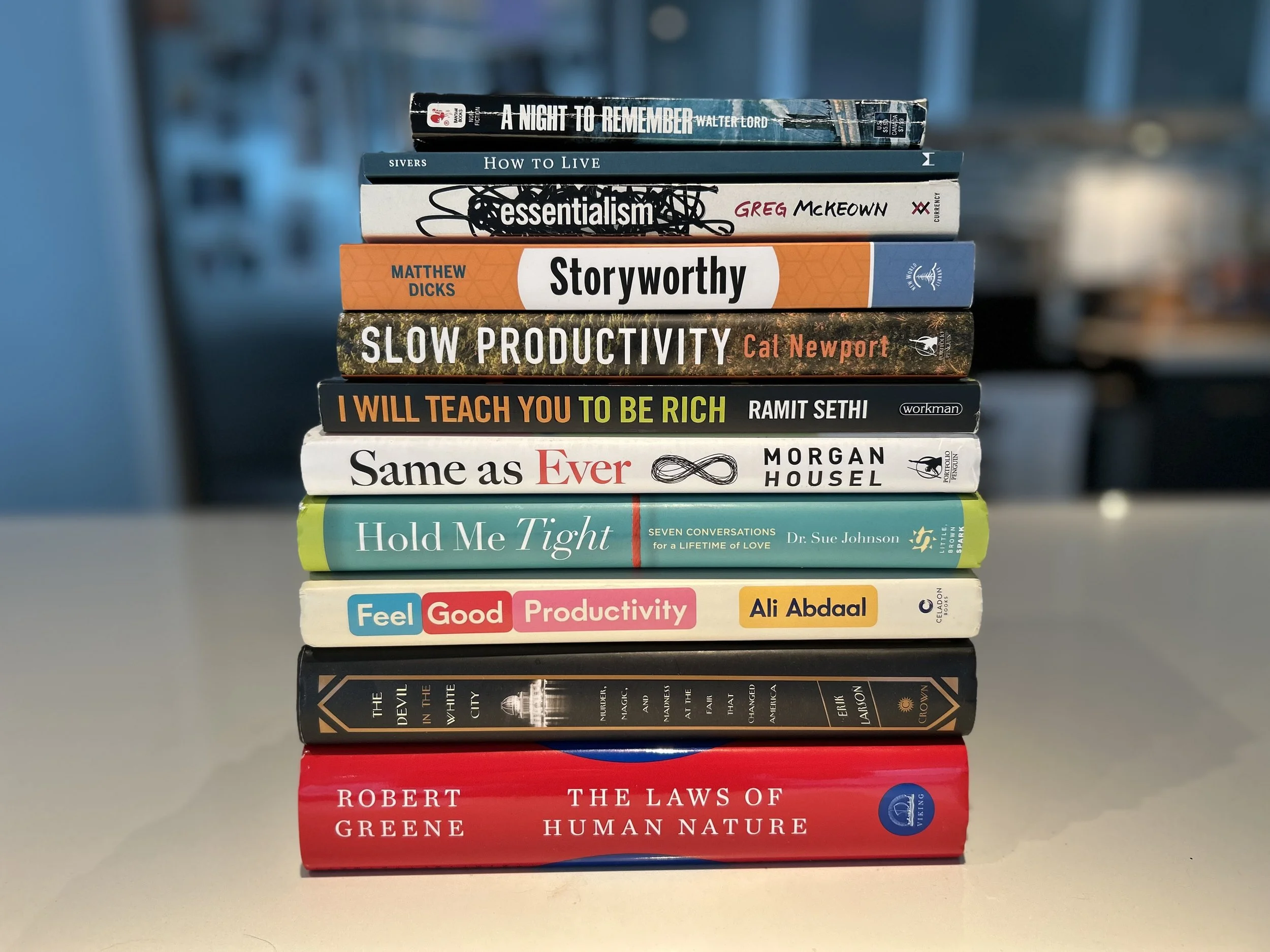The Best Books I Read in 2024
I enjoyed writing this last year and thought I’d continue the tradition this year. Shoutout to Ryan Holiday for inspiring this post.
My New Year’s resolution last year was to read more fiction, but as you can see, it didn’t hold up. Fans of non-fiction may enjoy this article. If you’re a fiction reader, stay tuned for next year.
These books are in no particular order:
A Night to Remember by Walter Lord
This brief book chronicles the sinking of the Titanic in April 1912. Lord provides first-hand accounts of what happened to the passengers and crew before, during, and after the collision with the iceberg. Many considered the sinking of the Titanic impossible, which led to a lack of safety preparation.
How to Live by Derek Sivers
Derek is one of my favorite modern-day writers, and I believe this to be his best work yet. We are always looking for the best way to live our lives, but often there are multiple ways to live a fulfilling life. The core principle of the book is that we require different approaches at different stages in our lives and need to be flexible to changes and demands. If you like one philosophy of life, try it. But don't be afraid to change it as your life evolves.
Essentialism by Greg McKeown
I reread this book this year after reading it for the first time 3 years ago. It is even more useful today than it was when I first read it a few years back. Essentialism isn’t about doing more things; it’s about how to get the right things done. It is a practical book on navigating the world in the age of infinite information and opportunity.
Storyworthy by Matthew Dicks
Storytelling is a powerful skill to have. Steve Jobs said, “The most powerful person in the world is the storyteller. The storyteller sets the vision, values and agenda of an entire generation that is to come.” Great stories don't require extraordinary events—they simply need to show transformation. Oftentimes, there are storyworthy moments that happen to us each day, we just need to be present to look for them.
Slow Productivity by Cal Newport
A must-read in today's "accomplish everything now" society. Cal reminds us that some of the greatest thinkers in history like Darwin, Einstein, and Newton spent decades on a single piece of work. We often think we can accomplish more tasks in a shorter period than we actually can and set unrealistic timelines. We would do ourselves a big favor if we set realistic expectations on what we can accomplish and when we can accomplish it. Cal sums it up nicely: "A little quality work every day will produce more and more satisfying results than frantic work piled on top of frantic work."
I Will Teach You to Be Rich by Ramit Sethi
A great resource for learning how to manage your finances and build systems to automate your savings, spending, and investments. Being rich doesn’t just mean that you have a lot of money. It means that you’re able to do the things you love without worrying about how much everything costs.
Same as Ever by Morgan Housel
“The biggest risk is always what no one sees coming because if no one sees it coming, no one’s prepared for it; and if no one’s prepared for it, its damage will be amplified when it arrives.” The thing that never changes is uncertainty about the future. We have no idea what is going to happen next. And things can become the most dangerous when people perceive them to be the safest.
Hold Me Tight by Dr. Sue Johnson
Johnson challenges common beliefs about relationship failure, arguing that emotional disconnection, not conflict, destroys marriages. Relationships are arguably the most important aspect of life, so we should treat them accordingly and learn more about how to grow and strengthen them.
Feel Good Productivity by Ali Abdaal
Rather than another "do more" manifesto, Abdaal shows how to align work with energy. His core premise: when we enjoy our work, quality and quantity naturally improve. In any work we do, there is always a way to make the process a bit more fun. We may just need to look a little bit harder.
The Devil in the White City by Erik Larson
Larson masterfully interweaves two 1893 Chicago narratives: the ambitious World's Fair construction and America's first documented serial killer—H.H. Holmes.
The Laws of Human Nature by Robert Greene
Understanding human nature is crucial for success in life and relationships. Humans are social beings, yet are infinitely complex in how we interact. Greene uses historical examples to illuminate timeless patterns in human behavior. He talks about observing people’s actions rather than words, how to recognize and manage your own emotional patterns, and how to protect yourself from manipulation.
